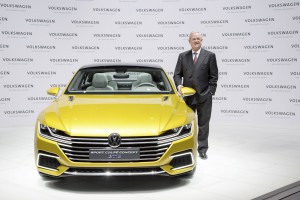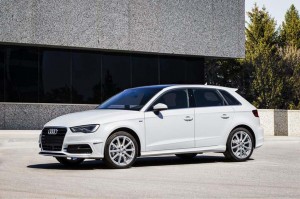Former Volkswagen CEO Martin Winterkorn was advised of the maker’s cheating on diesel emissions tests at least 16 months ahead of when the scandal became public, the automaker confirmed.
Separately, VW has issued an advisory to its shareholders revealing it did not expect the subterfuge to erupt into what is arguably the biggest crisis in its post-War history. The company said it anticipated a quick resolution with U.S. authorities and that the cost of resolving the issue would likely be “not especially high.”
With more than 500 lawsuits facing it, including one filed by the U.S. Justice Department, the costs appear to be mounting – as became clear Thursday when VW’s luxury subsidiary Audi reported a sharp, 6.1% decline in 2015 earnings. Audi shares several of the diesel engines involved in the emissions scandal.
Since the U.S. Environmental Protection Agency last September revealed that VW had rigged a so-called “defeat device” on its 2.0-liter diesel engines to pass emissions tests, one of the big questions has been who at the company actually knew about the subterfuge. While acknowledging the cheating, the maker has, until now, said it was limited to a handful of engineers.
But it now appears that former CEO Winterkorn was advised in a May 2014 memo that there problems with U.S. diesel tests. The memo was included in “extensive weekend mail,” but “Whether and to which extent Mr. Winterkorn took notice of this memo at that time is not documented,” the company said.
There have been indications that others in Winterkorn’s senior management circle also were advised of the problem before it blew up into a public scandal, but VW now says the issue “did not initially receive particular attention at the management level.”
(Gas prices suddenly on the rise again. Click Here to see how high they’ll go.)
Hindsight suggests the carmaker grossly underestimated the impact the issue would have. In November 2014, Winterkorn received another memo indicating that it would cost about 20 million Euros – at that time about US$25 million.
It based that on what happened when other automakers ran afoul of the U.S. Clean Air Act. The new memo to investors cited one case involving an unidentified automaker fined $100 million for emissions violations.
VW’s interpretation was that penalties would not be especially high for a company the size of Volkswagen,” it said in its new statement, adding that, “It was expected that the diesel matter could be resolved with the U.S. authorities by disclosing the software modification, agreeing on appropriate measures to restore vehicle compliance with the law and the payments of potential fines in line with prior U.S. settlements.”
It appears the maker couldn’t have been more wrong. The new lawsuit by the Justice Department could lead to penalties of up to $46 billion – though most analysts expect the final figure to be substantially lower if both sides can strike an amiable deal.
That is proving more difficult than expected. The EPA has so rejected proposed fixes for the diesel problem, and a federal judge in San Francisco has given VW until the end of this month to come up with an acceptable solution.
(US auto sales surge – but VW takes another tumble. Click Here for February’s results.)
Even if the fines are vastly watered down, the costs could be significant. That jurist, U.S. District Judge Charles Breyer, will oversee the handling of more than 500 civil suits, most representing owners of VW diesel models. The maker has also been sued by dealers and by investors who claim the company’s deeds damaged their stock holdings.
Shares rebounded slightly on Thursday in European trading, hovering around $116, but they are still running at barely half their value immediately before the diesel scandal was revealed last autumn.
The company has so far set aside more than $7 billion to handle the crisis, while lining up $20 billion more in a credit line.
The impact became apparent on Thursday morning when luxury subsidiary Audi reported earnings for 2015 fell 6.1%, year-over-year, to 4.84 billion Euros, or $5,3 billion. Audi has been far less impacted by the diesel scandal but nonetheless said related costs came to 298 million Euros, or $325.7 million last year.
Like parent VW, Audi will not be able to sell any of its diesel models in the U.S. until it can bring them into compliance with American emissions regulations, so the costs will continue to mount this year.
(Audi RS Q3 Performance amps up SUV competition. For more on its Geneva Motor Show debut, Click Here.)


